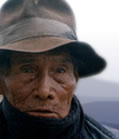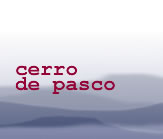THEMES IN THIS
TESTIMONY
Culture and Customs

Education

Festivals

Gender

History

Identity

Industry

Politics

Spiritual Beliefs

Click on arrows
to find more
testimonies
featuring
these themes
|
|
Sex
|
male
|
|
|
Age
|
42
|
|
|
Occupation
|
cultural researcher
|
|
|
Location
|
Cerro de Pasco
|
|
|
Date
|
1995
|
|
summary
Victor grew up in Cerro de Pasco. He works as a librarian with the Centro de Cultura Popular Labour (Labour Institute of Popular Culture) there. He is an enthusiastic researcher on local customs, traditions and social history and gives detailed, moving and poetic, though somewhat idealised, descriptions of the link between culture and history and the principle of reciprocity between kin and neighbours. He makes a brief mention of gender inequalities/ discrimination, which appear to be getting worse.
He describes several fiestas (festivals, celebrations). He traces the evolution of Carnival, highlighting the way it changed from an elite to a popular festival as well as its socio-political and ritual content. He also describes the social significance of certain rituals, and how communities cooperate and reciprocate in order to cover the huge costs of certain festivals.
He feels conventional historical explanations of the origins of Cerro de Pasco, the people and the mining tradition, are inadequate and advocates further social history research, such as they do in his institute. He fears that the town of Cerro de Pasco will disappear as mineral reserves are running out - unless mining resources are invested in agriculture which is the only local alternative. He has strong views that mining has brought only sorrow to the people of Cerro and that any progress is fruit of their own struggle. He particularly criticises the university's lack of awareness of local needs and issues.
detailed breakdown
|
You will need a password from Panos to view the full
transcript of the interview. To apply for a password, click here.
Once you have a password, click here to go to the beginning
of the transcript. You can also click on any section of the
breakdown of content below and go straight to the
corresponding part of the transcript.
|
| Section 1 |
Early memories of life in the countryside and love of grandparents. Wanted to be with them rather at school
|
| Section 2 |
Memories of his father, a miner: in early years only saw him once a week
New Year celebrations in Cerro - drink hot chocolate and eat special breads
Descent of the Kings (cribs are taken down) on Jan 20 marks the beginning of Carnival. History of Carnival clubs, which were dominated by elites
|
| Section 3 |
Satirical/burlesque content of Carnival verses. Contemporary political jibes: reads section of 1995 Carnival verse, getting at local councillors
Describes influence on Carnival customs of different immigrants who came for mining wealth from the 1900s - Pasco is a cosmopolitan city now.
|
| Section 4-5 |
Mining really began in Cerro in 1500s
Describes how Argentinian muleteers influenced local music - mulisas
Evolution of Carnival celebrations – no longer elitist. Detailed description of how he ended up as president of a Carnival Club - shows it wouldn't have been possible in past. Carnival also celebrated by town folk. Describes carnival rituals in countryside: how they make local hot alcoholic drink
|
| Section 6 |
Describes ritual of dismantling crib in Jan and its significance: “when the Christian feast ends and the wild Carnival feast is unleashed.”
“Feast of the Crosses” in May – incorporates different elements, eg pre-Christian southern cross (reference point in the sky), and the Catholic cross, a symbol of colonial oppression
Need for further historical research – cites two different views of origins of Chonguinada dance, also slave origin of Negreria dance
|
| Section 7 |
The way kin and social ties and commitment to reciprocity enable people to cover costs (may be as high as $10,000) when they only earn $250/month. Role of mayordomo (master of ceremonies). Feast of the Crosses (May) is also a harvest celebration - dual function - to thank the Jircas (guardian mountains) as well as Jesus
Rituals of the Day of the Dead - families remember their dead, talk about them, leave food and drink. Very festive and sharing time
|
| Section 8-9 |
“It seems like a curse that most people born round here are predestined to die in the mines.” But young people have other aspirations now – for example, to study. Social significance of first-born. Girl child used to mean abundance and boy some problems. Changing now, more patriarchal, boys seen as preserving family name and bringing respect to family and sisters.
Research shows miners often have both a wife and another partner/family
Young people lose sense of cultural identity through attachment to modern music, but generally regain it in early 20s. Optimistic about commitment of young people to their heritage
Believes Cerro de Pasco is destined to disappear in 70 years, when minerals run out, so the cultural recovery work of his Institute is important. Much history still to be written, cites examples of legends and myths, the need to clarify if they're history or fiction, and to explain the real origins of Cerro.
|
| Section 10 |
Tells legend of Huaricapcha - origin of the discovery of the mineral wealth. It puts the date at 1630, whereas he knows it was earlier.
Brief description of Spanish influence in legends eg Juan del Oso story
Muqui myth - the Muqui is jealous and forbids women to go into the mines: no women – researchers, workers, journalists or engineers - have ever gone below the surface.
|
| Section 11 |
More references to legend and songs. Favourite local song - a mulisa - interprets the sad text as the story of the mining peoples. “Someone once said to me - but these songs are so sad they make you cry. It's because they have pillaged this place, not only minerals but also our thoughts, these people have to complain one way or another. The songs are a testament, they're like banners, or loud-speakers through which we make known our laments and pains, but also our hopes and good-fortunes.” Songs are testament to history.
Mining industry needs to put something back – invest in and regenerate agriculture - as only hope for future of Cerro de Pasco
|
| Section 12 |
Mining has brought more pain than sorrow - no benefit to the town only to wealthy. University and education institutes are more a product of people's efforts – the union. But now that link has gone: the university doesn't deal with important local issues eg privatisation of Centromin. It needs to pay attention to local needs |
|


